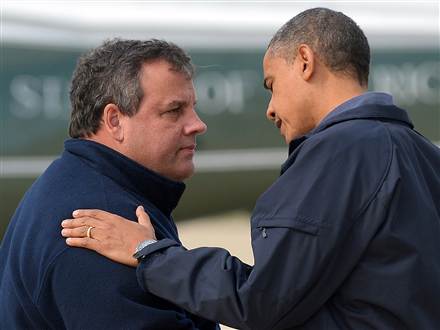
[polldaddy poll=6752248]
Is Christie’s decision about politics or policy? Answer our poll. You decide.
Saying “No” Again
New Jersey Governor, Chris Christie vetoed the latest Health Exchange bill sent to his desk by Democratic legislators on Thursday moving New Jersey one step closer to a federally facilitated Health Exchange. If the Governor does not come up with his own Health Exchange plan by December 15th, New Jersey could default to one run by the Federal government. This would mean less control for a Governor that has shown in the past he enjoys the leadership seat. However, Governor Christie and many other Republican law makers argue that they have not been given enough details about Health Exchanges to make an informed decision on whether they should create one on their own. So what details are these Republican Governors specifically referring to? Here is a big one; the Basic Health Program (BHP).
What is it?
BHP is an optional program administered by a partnership between the Federal Government and a State to provides Medicaid-like benefits to recipients that earn below 200% of the Federal poverty level (roughly $22,400) and are not eligible for Medicaid. The benefits would have very modest co-payments and cost-sharing. Monthly premiums would also be pegged at very low levels; roughly 3% of an individual’s annual income. There are also cost-sharing subsidies built into the plan to make sure that out of pocket expenses are manageable for people at lower income levels. The plans would have to meet an 87% actuarial value for people with incomes between 150-200% FPL and a 94% actuarial value for those earning below 150% FPL. Actuarial Values refer to the percentage of health care costs a health insurance plan is required to cover. So if the BHP population on average had $10,000 in health care costs per year, a BHP plan for someone earning betwel 150% FPL would have to cover $9,400 of the member’s health care expenses. This coverage level is described by the law as “Platinum” and closely matches the level of benefits administered in Medicaid.
Health and Human Services (HHS) would pay 95% of the cost of the program in year one. This actually could save New Jersey tax payers millions of dollars in the near term. Today, New Jersey provides Medicaid to all children who are in households that earn below 350% FPL (roughly $39,100) and adults below 200% FPL when state funds permit. New Jersey pays a 40% share of these costs while the Federal government picks up the rest. With a BHP, the population receiving these benefits below 200% FPL would be transitioned out of the Medicaid program and into the BHP. This would shrink the New Jersey share of the cost to 5% with the Federal government picking up the remaining 95%. In 2010, the cost of the New Jersey Medicaid program reached $10.1 billion with roughly 1.2 million enrollees. That equates to $8,417 in health costs per person per year. New Jersey’s share was $3,337 of the burden. A BHP could potentially shrink that to $420 per person.
For comparison, $8,417 is above the 2010 U.S. average of $7,538. Internationally, the next closest country in costs is Norway with per person per year healthcare costs of $5,003.
New Jersey
The NJ Health Exchange bill that Governor Christie vetoed explicitly requires the state to set up a Basic Health Program. The state has over 835,000 people who potentially could be eligible for the BHP. Additionally, compared to state-wide averages, New Jersey has a smaller proportion of lower-income citizens in their State.
|
New Jersey |
United States |
|||
|
Federal Poverty Level |
Population |
% |
Population |
% |
| Under 138% |
1,996,600 |
23% |
86,370,800 |
28% |
| 139-200% |
838,700 |
10% |
34,223,900 |
11% |
| 200-400% |
2,048,887 |
24% |
85,415,025 |
28% |
| +400% |
3,802,598 |
44% |
101,881,875 |
33% |
| Total |
8,686,785 |
100% |
307,891,600 |
100% |
| Source: Urban Institute and Kaiser Commission on Medicaid and the Uninsured | ||||
So Why Not?
So if the impact of the program are favorable to New Jersey why would Christie veto? HHS and the Obama Administration have been reluctant to give information on the specifics around this program. On November 30th over 400 pages of guidance were released by the Federal Government and there was not a single mention of the BHP. Additionally, there are not enough details in the information that is available to fully understand how the BHP will properly operate.
Here are questions that Governor Christie and many other State leaders would greatly appreciate answers to:
- How does it officially operate?
- Does the BHP follow the State’s essential health benefits package or do they resemble Medicaid or NJ Family Care?
- Is the 95% Federal funding based on a national average or is it specific to NJ? This is very important since NJ’s cost per person exceeds the national average.
- Are brokers allowed to sell BHP or is it restricted to just Navigators.
- If broker can sell BHP, how are commissions administered?
- What should be the reimbursement rate for BHP to providers? Medicaid? A higher percentage of Medicaid? 150%? 200%?
- How do “risk adjustments” in the Exchange impact the BHP?
- What happens to the commercial exchange market if the population is only 200% of FPL and higher?
- Does the BHP distort the commercial exchange with adverse selection?
- Does the BHP allow flexibility for an out-of-network option?
Rutgers’ Center for State Health Policy released a report on December 2011 looking at different policy implications of the Basic Health Program. You can find their report here.
